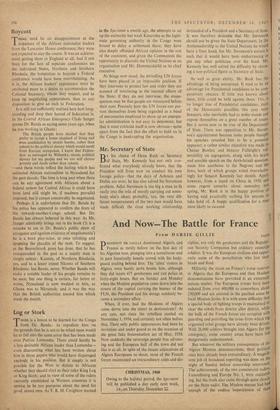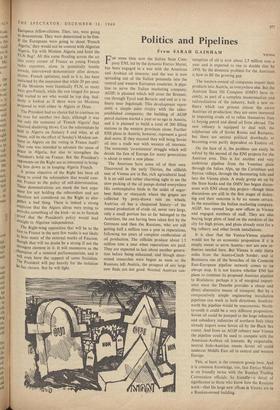And Now—The Battle for France
From DARSIE GILLIE is
pAg
pRESIDENT DE GAULLE dominated Algeria and France as rarely before on the first day of his Algerian tour, plunging into a tumultuous and in part fanatically hostile crowd with his body- guard trailing behind him. The 'ultra' rioters in Algiers were barely news beside him, although they did injure 475 gendarmes and riot police in forty-eight hours. But on Sunday and Monday when the Moslem population came down into the streets of the capital carrying the banner of the FLN, the President and his doings suddenly be- came a secondary affair.
When, if ever, had the Moslems of Algiers come down into the street to demonstrate? At any rate, not since the rebellion started on November I, 1954, and certainly not often before that. Their only public appearances had been by invitation and under guard as on the occasion of the great fake fraternisation act of May, 1958. Now suddenly the sovereign people Was advanc- ing and the European half of the town did not like it at all. In spite of the insane adjurations of Algiers Europeans to shoot, most of the French forces maintained an extraordinary calm and dis- ciplinc, not only the gendarmes and the Republi' can Security Companies but ordinary conscriPt soldiers. It was the European civilians and appalently some of the parachutists who lost their heads and fired.
Militarily the strain on France's troop reserves in Algeria that the European and then Moslei demonstrations have provoked is an extremelY serious matter. The European troops have been reduced from over 400,000 to somewhere about 250,000 and are assisted in the pacified areas bY local Moslem levies. It is with some difficulty that a special body of fighting troops is maintained to clear the rebels from district after district, while the bulk of the French forces are occupied %Oh guarding and patrolling the areas from which big organised rebel groups have already been driven. With 26,000 soldiers brought into Algiers for the emergency, some country areas have been left dangerously undermanned.
But whatever the military consequences of the Algiers Moslem demonstrations, their political ones have already been extraordinary. A magn. cent job of broadcast reporting was done on the night of Sunday before censorship intervened. The achievements of the two commercial radio
S'
Luxembourg and Europe No. 1, were outstand" ing, but the truth also came through quite clearlY on the State radio. The Moslem masses had hod enough of the endless impertinence of their European fellow-citizens. They, too, were going to demonstrate. They were determined to be free. If the Europeans were going to shout 'French Algeria,' they would not be content with Algerian Algeria. Up with Moslem Algeria and hoist the !I-N flag All this came flooding across the air into every corner of France as young French radio reporters, alone in potentially hostile Crowds, interviewed- demonstrator after demon- strator. French optimism, such as it is, has been sustained by the assurance that while 20 per cent. of the Moslems were fanatically FLN, as many Were pro-French, while the rest longed for peace and waited to see who would be top dog. Sud- denly it looked as if there were no Moslems Prepared to wait either in Algiers or Oran.
The President had no choice but to continue on his tour for another two days, although it was not only the nonsense of 'French Algeria' that received shattering blows. Can the referendum be held in Algeria on January 8 and what, at all events, will be the effect of Sunday's Moslem out- burst in Algiers on the voting in France itself? That vote was intended to advance the cause of Peace in Algeria, but also to strengthen the President's hold on France. But the President's °PPonents on the Right are as interested in bring- ing him down as in keeping Algeria French.
A prime objective of the Right has been all along to avoid the referendum that would em- it* France to the policy of self-determination. These demonstrations are much the best argu- 'Tient for not holding the referendum and are therefore not considered on the Right as alto- gether a bad thing. There is indeed a strong suspicion that the Algiers ultras were trying to Provoke something of the kind—so as to furnish Proof that the President's policy would lead straight to Algerian independence.
The Right-wing opposition that will be to the fore. in France in the next few weeks is not likely to bear many of the external marks of Fascism, though that will no doubt be a strong if not the strongest element in it. It will manceuvre as the champion of a restored parliamentarism, and it MU even have the support of some Socialists. The President will pay heavily for the isolation he has chosen. But he will fight.



































 Previous page
Previous page